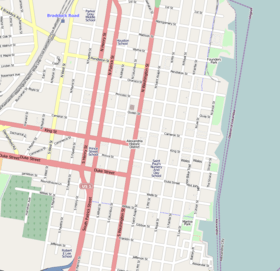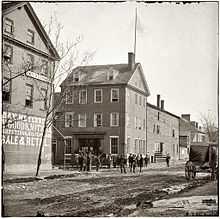Marshall House (Alexandria, Virginia)
| Marshall House | |
|---|---|
 The Marshall House Inn (photo 1861) | |
 | |
| General information | |
| Coordinates | 38°48′16.90″N 77°2′40.45″W / 38.8046944°N 77.0445694°W |
| Demolished | 1950s |



The Marshall House was a hotel that stood on the corner of King Street and South Pitt Street in Alexandria, Virginia. At the beginning of the American Civil War in 1861, it was the site of the killing of Col. Elmer E. Ellsworth during the Union army takeover of Alexandria. Ellsworth was a popular and highly prominent officer and a close friend of Abraham Lincoln. He was the first conspicuous casualty and the first officer killed in battle in the war, and his death became a cause célèbre for the Union. He was shot by the hotel proprietor James W. Jackson after removing a Confederate flag from the roof of the hotel, and Jackson was then killed immediately after he killed Ellsworth.
On the other side, Jackson was celebrated for flying the flag and dying while defending the Confederate cause. At the current Hotel Monaco Alexandria, which was built on the site where the Marshall House once stood, a plaque at the corner of the building commemorates the death of Jackson,[1] who it calls the "first martyr to the cause of Southern Independence" and says "was killed by federal soldiers while defending his property and personal rights".[2] The plaque makes no mention of Jackson's shotgun slaying of Col. Ellsworth.[3]
History
Ellsworth, founder of the 11th New York Volunteer Infantry Regiment known as the "Fire Zouaves", was killed at the Marshall House on May 24, 1861 (the day after Virginia's secession was ratified by referendum) during the Union take-over of Alexandria. He was shot by the hotel proprietor James W. Jackson, who was then immediately killed by Corporal Francis E. Brownell, one of the four soldiers accompanying Ellsworth. Ellsworth, a young Illinois lawyer and friend of the Lincolns, became the first Union officer to die in the Civil War.[4] Brownell later received the Medal of Honor for his action.
Ellsworth was killed as he descended the stairs of the hotel after removing a Confederate flag from its roof. Jackson had raised the flag over the hotel, which was at a prominent location visible from the White House, and he had said the flag would only be taken down "over his dead body".[5][6]
Ellsworth's body was taken back across the Potomac to Washington, D.C. and was laid in state in the East Room at the White House.[7] Immediately after the incident, thousands of Union supporters rallied around Ellsworth's cause and enlisted, and "Remember Ellsworth" became a patriotic slogan. The 44th New York Volunteer Infantry Regiment called itself the "Ellsworth Avengers",[7] as well as "The People's Ellsworth Regiment".
Souvenir hunters carried away bits of the hotel as mementos, especially including portions of the stairway.[1]
The building was torn down in the 1950s. Today the site of the Marshall house is occupied by a Hotel Monaco. The current hotel is adorned by a plaque that reads:[2]
The Marshall House
stood upon this site, and within the building
on the early morning of May 24, 1861
James W. Jackson
was killed by federal soldiers while defending his property and
personal rights as stated in the verdict of the coroners jury.
He was
the first martyr to the cause of Southern Independence.
The justice of history does not permit his name to be forgotten.
Not in the excitement of battle, but coolly and for a great principle,
he laid down his life, an example to all, in defence of his home and
the sacred soil of his native state
Virginia
Artifacts collected during the construction process of the Hotel Monaco were preserved by local archeologists and may be seen in the Old Torpedo Factory's third floor exhibit (the Alexandria Archaeology Museum), three blocks away on King Street.
Notes
| Wikimedia Commons has media related to Marshall House, Alexandria Virginia. |
- ↑ 1.0 1.1 Martha M. Boltz (May 18, 2011). "Jackson and Ellsworth: Death on both sides of the Civil War". The Washington Times.
- ↑ 2.0 2.1 The Marshall House historical marker article, Historical Marker Database. (accessed 2013-06-19)
- ↑ NY honoring 1st Union officer killed in Civil War, NBC News, May 15, 2011. (accessed 2013-06-19)
- ↑ Civil War Firsts, Georgia's Blue and Gray Trail, Georgia's Historic High Country Travel Association. (accessed 2013-06-19)
- ↑ Alexandria in the Civil War historical marker article, Historical Marker Database. (accessed 2013-06-19)
- ↑ Photograph of Alexandria in the Civil War historical marker, Historical Marker Database. (accessed 2013-06-19)
- ↑ 7.0 7.1 Goodheart, A., 1861: The Civil War Awakening, Alfred A. Knopf, 2011 (lying in state, p. 288, Ellsworth Avengers, p. 289).